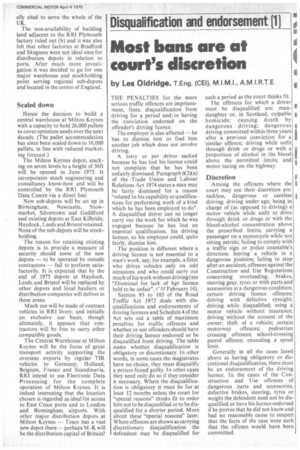Disqualification and endorsement (1)
Page 51

If you've noticed an error in this article please click here to report it so we can fix it.
Most bans are at court's discretion
by Les Oldridge, T.Eng. (CEO, M.I.M.I., A.M.I.R.T.E.
THE PENALTIES for the more serious traffic offences are imprisonment, fines, disqualification from driving for a period and/or having the conviction endorsed on the offender's driving licence.
The employer is also affected — he has to dismiss him or find him another job which does not involve driving.
A lorry or psv driver sacked because he has lost his licence could not complain that he has been unfairly dismissed. Paragraph 6(2Xa) of the Trade Union and Labour Relations Act 1974 states a man may be fairly dismissed for a reason "related to his capability or qualifications for performing work of a kind which he has been employed to do". A disqualified driver can no longer carry out the work for which he was engaged because he has lost an essential qualification, his driving licence, so his employer could, quite fairly, dismiss him.
The position is different where a driving licence is not essential to a man's work, say, for example, a fitter who drives vehicles only on odd occasions and who could carry out much of his work without driving (see "Dismissal for lack of hgv licence held to be unfair", C AI February 14).
Section 93 to 103 of the Road Traffic Act 1972 deals with disqualifications and endorsements of driving licences and Schedule 4 of the Act sets out a table of maximum penalties for traffic offences and whether or not offenders should have their driving licence endorsed or be disqualified from driving. The table states whether disqualification is obligatory or discretionary. In other words, in some cases the magistrates have no choice, they must disqualify a person found guilty. In other cases they need only do so if they consider it necessary. Where the disqualification is obligatory it must be for at least 12 months unless the court for "special reasons" thinks fit to order him not to be disqualified or to be disqualified for a shorter period. More about these "special reasons" later. Where offences are shown as carrying discretionary disqualification the defendant may be disqualified for such a period as the court thinks fit.
The offences for which a driver must be disqualified are: manslaughter or, in Scotland, culpable homicide; causing death by dangerous driving; dangerous driving committed within three years after a previous conviction for a ' similar offence; driving while unfit through drink or drugs or with a proportion of alcohol in the blood above the permitted limits; and motor racing on the highway.
Discretion
Among the offences where the court may use their discretion are: reckless, dangerous or careless driving; driving under age; being in charge of (as opposed to driving) a motor vehicle while unfit to drive through drink or drugs or with the blood-alcohol concentration above the prescribed limits; carrying a passenger on a motorcycle while not sitting astride; failing to comply with a traffic sign or police constable's direction; leaving a vehicle in a dangerous position; failing to stop after an accident; offences against the Construction and Use Regulations concerning overloading, brakes, steering gear, tyres or with parts and accessories in a dangerous condition; certain driving licence offences; driving with defective eyesight; driving while disqualified; using a motor vehicle without insurance; driving without the consent of the owner; theft of a vehicle; certain motorway offences; pedestrian crossing offences; school-crossing patrol offence; exceeding a speed limit.
Generally in all the cases listed above as, having obligatory or discretional disqualification, there must be an endorsement of the driving licence. In the cases of the Construction and Use offences of dangerous parts and accessories, defective brakes, steering, tyres or weight the defendent need not be disqualified or have his licence endorsed if he proves that he did not know and had no reasonable cause to suspect that the facts of the case were such that the offence would have been committed.




































































































